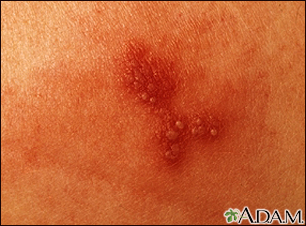Hormones. Hormonal changes, like those that occur in the menstrual cycle, can affect genital herpes outbreaks. Surgery, weak immune system. Trauma to the body, such as having surgery, may make herpes symptoms appear.
Ainsi, Can I get over-the-counter treatment for genital herpes? Over-the-counter (OTC) antiviral therapy creams may help speed recovery from oral or genital herpes infections. In addition, other options can help reduce pain. Some to consider include: Abreva (docosanol ): This is the only FDA-approved antiviral medication for herpes infection that you can get without a prescription.
How long do genital herpes outbreaks last? If sores are on the genitals, a stinging or burning feeling while urinating is common. The first outbreak of genital herpes may last 2–4 weeks. During this time, the sores break open and release fluid. Over a period of days, the sores become crusted and then heal without leaving scars.
de plus, What can be mistaken for herpes? Herpes symptoms can be mistaken for many other things, including:
- A different STI which causes visible lesions, such as Syphilis or genital warts (HPV)
- Irritation caused by shaving.
- Ingrown hairs.
- Bacterial vaginosis (BV)
- Pimples.
- Yeast infections.
- Haemorrhoids.
- Bug bites.
What are the first signs of herpes 1?
Symptoms
- Pain or itching. You may experience pain and tenderness in your genital area until the infection clears.
- Small red bumps or tiny white blisters. These may appear a few days to a few weeks after infection.
- Ulcers. These may form when blisters rupture and ooze or bleed. …
- Scabs.
How long do genital herpes sores last? If sores are on the genitals, a stinging or burning feeling while urinating is common. The first outbreak of genital herpes may last 2–4 weeks. During this time, the sores break open and release fluid. Over a period of days, the sores become crusted and then heal without leaving scars.
What can be mistaken for genital herpes? Herpes symptoms can be mistaken for many other things, including:
- A different STI which causes visible lesions, such as Syphilis or genital warts (HPV)
- Irritation caused by shaving.
- Ingrown hairs.
- Bacterial vaginosis (BV)
- Pimples.
- Yeast infections.
- Haemorrhoids.
- Bug bites.
How do you clean genital herpes? Doing the following may help sores heal:
- Wash sores gently with soap and water. Then pat dry.
- Do not bandage sores. Air speeds healing.
- Do not pick at sores. They can get infected, which slows healing.
- Do not use ointment or lotion on sores unless your provider prescribes it.
How often does genital herpes flare up?
The average number of outbreaks for a person with genital HSV-2 is four to five per year. The average for genital HSV-1 is less than one outbreak per year. Usually, there are more outbreaks during the first year, and many people find that outbreaks become less severe and less frequent with time.
What do genital herpes look like when healing? Genital sores vary in size and number, but as with oral herpes, they look like pimples or blisters filled with fluid. They will burst and develop a yellowy crust as they heal.
What does early stage genital herpes look like?
Genital herpes outbreaks usually look like a cluster of itchy or painful blisters filled with fluid. They may be different sizes and appear in different places. The blisters break or turn into sores that bleed or ooze a whitish fluid.
Does herpes make your VAG smell? Herpes vaginal discharge
It’s most common to have discharge when you’re having other symptoms like sores. This liquid also tends to happen along with a strong smell that many people with herpes describe as “fishy.” This smell usually gets stronger or more pungent after having sex.
What are the signs of herpes on a woman?
The first signs may include:
- Itching, tingling, or burning feeling in the vaginal or anal area.
- Flu-like symptoms, including fever.
- Swollen glands.
- Pain in the legs, buttocks, or vaginal area.
- A change in vaginal discharge.
- Headache.
- Painful or difficult urination.
- A feeling of pressure in the area below the stomach.
What are signs of herpes for females?
The first signs may include:
- Itching, tingling, or burning feeling in the vaginal or anal area.
- Flu-like symptoms, including fever.
- Swollen glands.
- Pain in the legs, buttocks, or vaginal area.
- A change in vaginal discharge.
- Headache.
- Painful or difficult urination.
- A feeling of pressure in the area below the stomach.
Is herpes 1 an STD? Genital herpes is a sexually transmitted disease (STD) caused by the herpes simplex virus type 1 (HSV-1) or type 2 (HSV-2).
What does a single herpes bump look like? Herpes looks like white, yellow, or red translucent sores or bumps, filled with a clear liquid, whereas pimples are pink or red and are not see-through. While pimples may appear individually as well as in clusters but in recognizable patterns, herpes sores are primarily observed in a bunch.
Do herpes sores smell?
It’s most common to have discharge when you’re having other symptoms like sores. This liquid also tends to happen along with a strong smell that many people with herpes describe as “fishy.” This smell usually gets stronger or more pungent after having sex.
What do genital herpes bumps look like? Herpes looks like white, yellow, or red translucent sores or bumps, filled with a clear liquid, whereas pimples are pink or red and are not see-through. While pimples may appear individually as well as in clusters but in recognizable patterns, herpes sores are primarily observed in a bunch.
Can antihistamines help herpes?
Antiviral medications and antihistamines not only successfully cleared the herpes infection and urticaria but also prevented further recurrences.
What does herpes tingling feel like? At the beginning of a herpes outbreak, you may experience a tingling, itching or burning sensation. As the episode progresses blisters may form and as they do the itching sensation usually stops and the blisters start becoming painful rather than itchy.
Is herpes still contagious after 10 years?
WASHINGTON — High rates of both overall and subclinical viral shedding continue even beyond 10 years among people with genital herpes simplex virus type 2 infection, suggesting that there is a continued risk of transmission to sexual partners long after initial infection.
Why is my herpes outbreak getting worse? After the first outbreak, the herpes virus stays in the nerve cells below the skin and becomes inactive. It usually becomes active again from time to time, traveling back up to the skin and causing more sores. Things like stress, illness, a new sex partner, or menstruation may trigger a new outbreak.
N’oubliez pas de partager l’article !



Discussion about this post